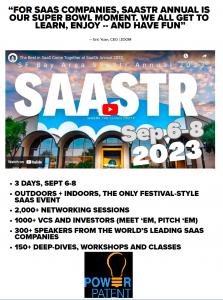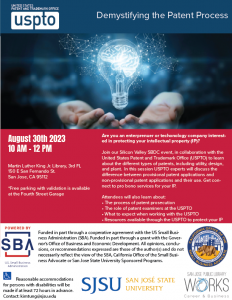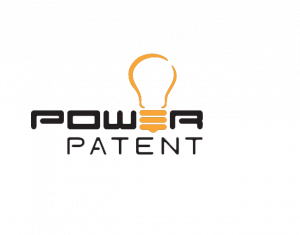PowerPatent to Showcase Game-Changing Generative AI Invention Disclosure to Patent Solution at SaaStr Annual 2023
PowerPatent to Showcase Game-Changing Generative AI Invention Disclosure to Patent Solution at SaaStr Annual 2023
SAN MATEO, CALIFORNIA, US, September 1, 2023/EINPresswire.com/ -- PowerPatent, a leader in innovative intellectual property (IP) solutions, is thrilled to announce its participation in the 9th SaaStr Annual, the world's premier gathering for Cloud and SaaS founders, VCs, and executives. Taking place from September 6th to 8th in the vibrant San Francisco Bay Area, this outdoor festival-style event is expected to draw over 12,500 industry leaders.
SaaStr Annual 2023 promises to be an unforgettable experience, featuring three full days of insightful workshops, engaging presentations, and thousands of mentoring sessions aimed at helping businesses scale faster in the cloud and SaaS space. With a focus on knowledge-sharing and networking, the event has earned its reputation as the "world's #1 cloud gathering."
PowerPatent is proud to be a part of this dynamic event, where it will showcase its cutting-edge generative AI invention disclosure to patent solution. As startups continue to drive innovation in the Cloud and SaaS sectors, protecting intellectual property is of paramount importance. PowerPatent offers a revolutionary approach, enabling startups to safeguard their inventions quickly and cost-effectively.
Key Features of PowerPatent's Generative AI Invention Disclosure to Patent Solution:
Speed: PowerPatent leverages the power of artificial intelligence to streamline the patent disclosure process, allowing startups to protect their IP rapidly.
Cost-Efficiency: By automating much of the patent application process, PowerPatent significantly reduces legal and administrative costs associated with intellectual property protection.
Accuracy: With advanced AI algorithms, PowerPatent ensures that patent disclosures are comprehensive and in compliance with legal requirements.
Accessibility: This innovative solution is designed to be user-friendly, making it accessible to startups and innovators without extensive legal expertise.
Competitive Advantage: By securing patents efficiently, startups can gain a competitive edge, attract investors, and establish a solid foundation for growth.
SaaStr Annual 2023 attendees are encouraged to visit PowerPatent's booth to learn more about how this groundbreaking technology can empower their businesses.
"We are excited to be a part of SaaStr Annual 2023 and share our AI-driven invention disclosure to patent solution with the Cloud and SaaS community," said Mary Kimani, Director of Communication at PowerPatent. "Innovation is at the heart of the Cloud and SaaS industries, and we believe that our technology can help startups protect their valuable intellectual property, allowing them to thrive and grow in today's competitive landscape."
Don't miss the opportunity to discover how PowerPatent is revolutionizing the way startups protect their intellectual property. Join us at SaaStr Annual 2023 in the San Francisco Bay Area from September 6th to 8th. For more information about PowerPatent and its innovative solutions, visit www.PowerPatent.com
A startup’s IP strategy can also significantly impact its attractiveness to potential strategic partners and acquisition suitors. Companies seeking to expand their product portfolio or technology capabilities often seek startups with complementary patents and trade secrets. A robust IP strategy can open doors to partnerships, licensing deals, and even lucrative acquisition opportunities, offering an attractive exit strategy for investors.
Patents and trade secrets play a significant role in attracting strategic partnerships and acquisitions for companies. The robust protection of intellectual property through patents and trade secrets demonstrates a company’s potential for growth, innovation, and competitive advantage, making it an attractive target for potential partners and acquirers. Let’s explore how patents and trade secrets contribute to attracting strategic partnerships and acquisitions:
Patent Licensing Opportunities
Companies with patented technologies can explore licensing opportunities with potential partners or acquirers. Licensing allows the company to generate additional revenue by granting others the right to use their patented technology in exchange for licensing fees or royalties. Strategic partners may be interested in licensing the technology to complement their existing offerings or enter new markets, while potential acquirers may see the opportunity to integrate the patented technology into their product portfolio.
Protection against Competitors
Having a robust intellectual property strategy, including trade secrets, creates barriers to entry for potential competitors. Companies with well-protected intellectual property are less vulnerable to infringement and copycat products, making them more attractive to potential partners or acquirers seeking to avoid legal disputes and market saturation.
Strengthening Market Position
Strategic partnerships and acquisitions are often pursued to strengthen a company’s market position. Companies with strong patents and trade secrets are better positioned to collaborate or merge with other players in the industry. By joining forces, partners can leverage each other’s strengths and fill gaps in their portfolios, allowing them to collectively gain a competitive advantage.
Potential for Market Disruption:
Companies with groundbreaking patented technologies or unique trade secrets have the potential to disrupt markets. Disruptive innovations can attract interest from strategic partners or acquirers seeking to capitalize on emerging trends or technologies. Such partnerships or acquisitions can enable the acquirer to expand its market reach, diversify its product offerings, and capitalize on the disruptive potential of the target company.
Intellectual Property Due Diligence
During the process of forming strategic partnerships or conducting acquisitions, potential partners or acquirers perform intellectual property due diligence. Companies with well-documented and protected intellectual property are more likely to pass this due diligence process successfully, giving potential partners or acquirers greater confidence in the company’s value and long-term potential.
Intellectual property (IP) plays a crucial role in modern business environments, providing companies with a competitive advantage that goes beyond conventional assets and capabilities. In this section, we will explore how intellectual property serves as a significant differentiator and strategic asset for businesses, enabling them to stay ahead in the competitive landscape.
Protection and Exclusivity
One of the primary benefits of intellectual property is its ability to protect innovative ideas and technologies from imitation and replication. For instance, patents offer inventors exclusive rights to their inventions, preventing others from producing, selling, or using the patented technology without permission. This protection ensures that the company has a head start in the market, without facing immediate competition from copycats.
Trademarks, on the other hand, safeguard a company’s brand identity, including its name, logo, and slogans. This exclusive protection helps companies build brand recognition and customer loyalty, enabling them to establish a unique market position.
Market Differentiation and Value Proposition
Intellectual property allows companies to differentiate their products or services from competitors. By offering patented technology, proprietary processes, or copyrighted content, companies can present distinctive value propositions that attract customers and create a loyal customer base. This differentiation also helps companies charge premium prices, leading to increased profitability.
Attracting Investment and Collaboration
Investors and partners are more likely to be attracted to businesses that possess a strong intellectual property portfolio. IP protection provides assurance that a company’s innovations and technology are safeguarded, reducing risks associated with competitors copying or infringing upon valuable assets. Consequently, companies with robust IP strategies often find it easier to secure investment and form strategic partnerships, fostering growth and expansion opportunities.
Barriers to Entry
Intellectual property can create significant barriers to entry for potential competitors. Startups or small businesses that possess groundbreaking technology protected by patents may dissuade larger players from entering the market due to the risks associated with potential infringement lawsuits. These barriers can help smaller companies carve out a niche and grow without immediate threats from well-established competitors.
2. Defensibility and Market Positioning
An extensive patent portfolio can serve as a defensive measure against competitors. Startups with well-protected intellectual property can safeguard their innovations, technology, or product design, preventing rivals from copying or stealing their ideas. This defensibility establishes a strong market positioning, which can attract potential investors seeking startups with a clear path to market dominance.
Defensibility and market positioning are critical aspects of a business’s long-term success and competitive advantage. In this section, we will explore how defensibility and market positioning are interconnected and how they are influenced by various factors, including intellectual property, differentiation, and customer perception.
As discussed earlier, intellectual property, such as patents and trademarks, can be essential components of a company’s defensibility strategy. Patents protect unique inventions and technologies, preventing competitors from using or selling similar products without permission. Trademarks safeguard a company’s brand identity, making it challenging for others to use similar names or logos that may confuse consumers.
By securing intellectual property rights, companies create legal barriers that deter potential competitors, safeguarding their innovations, brand recognition, and market position. This defensibility allows businesses to focus on growth and innovation, rather than continuously defending against copycats or infringement.
Differentiation: Standing Out from the Crowd
Market positioning, on the other hand, involves how a company presents itself and its offerings to the target audience. Differentiation is a fundamental aspect of market positioning, where a company establishes its unique value proposition to distinguish itself from competitors.
Effective differentiation allows a company to address customer needs and desires better than competitors, creating a perception of superiority. By offering unique features, superior quality, exceptional customer service, or innovative solutions, a company can build a strong market position and customer loyalty.
Intellectual property can be a crucial enabler of differentiation. Patented technology, for instance, may offer unique features or functionalities that competitors cannot replicate without infringing on the patent. This technological differentiation can drive customer preference and loyalty, giving the company a competitive edge.
Trademarks play a significant role in brand differentiation. A well-recognized and trusted brand name or logo can evoke positive emotions and associations among customers, leading to brand loyalty and repeat business.
Customer Perception: The Key to Market Positioning
Market positioning relies heavily on how customers perceive a company and its products or services. A positive brand image, reputation for quality, and a strong value proposition all contribute to shaping customer perception. Companies that successfully align their offerings with customer needs and preferences are more likely to secure a favorable market position.
Patents and Trade Secrets are Proof of Innovation and Technical Expertise
3. Proof of Innovation and Technical Expertise
The patent application process is rigorous and requires extensive documentation of the innovation’s novelty, usefulness, and non-obviousness. A granted patent is, therefore, a compelling proof of a startup’s innovative capabilities and technical expertise. Investors can interpret a strong patent portfolio as an indication of the company’s potential to develop groundbreaking solutions, leading to market disruption and sustainable growth. Let’s explore how patents and trade secrets act as proof of innovation and technical expertise for businesses:
Patents: Demonstrating Novelty and Inventiveness
Patents are official grants of exclusive rights given to inventors or companies for their novel and non-obvious inventions or innovations. When a company successfully obtains a patent, it demonstrates that its technology or product is unique, inventive, and provides a practical solution to a specific problem.
The process of obtaining a patent involves a thorough examination by the patent office, where the company must demonstrate that its invention is different from existing technologies and that it meets the criteria of novelty, non-obviousness, and industrial applicability. The patent application process requires detailed technical documentation and legal arguments to prove the uniqueness of the invention.
The granting of a patent is, therefore, a clear validation of the company’s technical expertise and innovation capabilities. It provides tangible evidence of the company’s ability to develop groundbreaking solutions that advance the state of the art in its industry.
Startups with patents in their key technologies or core products can enjoy market exclusivity during the patent term, usually 20 years from the filing date. This exclusivity allows them to establish a dominant position in the market and generate substantial revenue without direct competition. Investors can look for startups that have strategically aligned their patent strategy with their revenue generation plans.
Patents and trade secrets are instrumental in enhancing market exclusivity and revenue generation for businesses. These forms of intellectual property protection provide companies with the legal and strategic tools to maximize their market position, drive revenue growth, and maintain a competitive advantage. Let’s explore how patents and trade secrets contribute to market exclusivity and revenue generation:
Market Exclusivity through Patents
When a company holds a patent for its innovative product, technology, or process, it gains exclusive rights to use, manufacture, and sell the patented invention for a specific period, typically 20 years from the filing date. This market exclusivity allows the company to operate without direct competition from others for the duration of the patent term.
Having a patent prevents competitors from legally replicating or exploiting the patented technology without obtaining proper licenses from the patent holder. This exclusivity enables the company to establish a dominant market position, command premium pricing, and capture a significant market share.
Market exclusivity also creates barriers to entry for potential competitors. New entrants will find it challenging to introduce similar products or technologies without infringing on existing patents, dissuading them from entering the market or making it more difficult for them to gain a foothold.
Revenue Generation through Patents
Patents play a pivotal role in revenue generation for companies. By holding exclusive rights to their inventions, companies can commercialize their innovations and generate revenue through various avenues:
a. Product Sales: Companies can manufacture and sell products based on patented technologies, benefiting from higher profit margins due to limited competition and increased customer willingness to pay for unique features.
b. Licensing: Patent holders can license their technology to other companies, allowing them to use the patented technology for a fee or royalty. Licensing deals provide a lucrative revenue stream without the need for extensive production or marketing efforts.
c. Cross-Licensing: In some cases, companies engage in cross-licensing agreements with other patent holders. This allows each party to use the other’s patented technology, fostering innovation and expanding product capabilities while generating additional revenue.
d. Litigation: In the event of patent infringement, companies can enforce their rights through legal action, seeking damages or licensing fees from infringing parties, thus further contributing to revenue generation.
About PowerPatent:
PowerPatent is a leading provider of AI-driven intellectual property solutions that empower startups and businesses to protect their innovations quickly, cost-effectively, and accurately. With a commitment to simplifying the patent process, PowerPatent is revolutionizing the way intellectual property is safeguarded in the modern era.
Mary Kimani
PowerPatent
+1 800-234-3032
email us here
Visit us on social media:
Facebook
Twitter
LinkedIn
Instagram
YouTube
TikTok
How PowerPatent AI Assisted Patent Workflow Software works
Legal Disclaimer:
EIN Presswire provides this news content "as is" without warranty of any kind. We do not accept any responsibility or liability for the accuracy, content, images, videos, licenses, completeness, legality, or reliability of the information contained in this article. If you have any complaints or copyright issues related to this article, kindly contact the author above.





